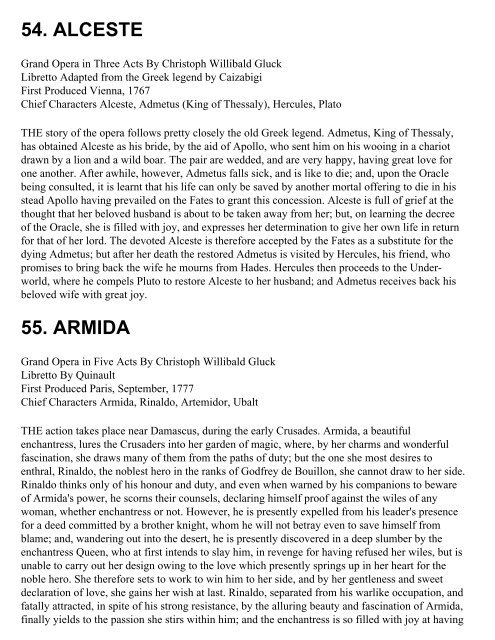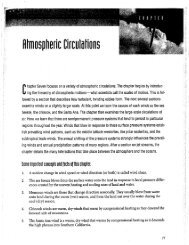Opera Plots I - MDC Faculty Home Pages
Opera Plots I - MDC Faculty Home Pages
Opera Plots I - MDC Faculty Home Pages
You also want an ePaper? Increase the reach of your titles
YUMPU automatically turns print PDFs into web optimized ePapers that Google loves.
54. ALCESTE<br />
Grand <strong>Opera</strong> in Three Acts By Christoph Willibald Gluck<br />
Libretto Adapted from the Greek legend by Caizabigi<br />
First Produced Vienna, 1767<br />
Chief Characters Alceste, Admetus (King of Thessaly), Hercules, Plato<br />
THE story of the opera follows pretty closely the old Greek legend. Admetus, King of Thessaly,<br />
has obtained Alceste as his bride, by the aid of Apollo, who sent him on his wooing in a chariot<br />
drawn by a lion and a wild boar. The pair are wedded, and are very happy, having great love for<br />
one another. After awhile, however, Admetus falls sick, and is like to die; and, upon the Oracle<br />
being consulted, it is learnt that his life can only be saved by another mortal offering to die in his<br />
stead Apollo having prevailed on the Fates to grant this concession. Alceste is full of grief at the<br />
thought that her beloved husband is about to be taken away from her; but, on learning the decree<br />
of the Oracle, she is filled with joy, and expresses her determination to give her own life in return<br />
for that of her lord. The devoted Alceste is therefore accepted by the Fates as a substitute for the<br />
dying Admetus; but after her death the restored Admetus is visited by Hercules, his friend, who<br />
promises to bring back the wife he mourns from Hades. Hercules then proceeds to the Underworld,<br />
where he compels Pluto to restore Alceste to her husband; and Admetus receives back his<br />
beloved wife with great joy.<br />
55. ARMIDA<br />
Grand <strong>Opera</strong> in Five Acts By Christoph Willibald Gluck<br />
Libretto By Quinault<br />
First Produced Paris, September, 1777<br />
Chief Characters Armida, Rinaldo, Artemidor, Ubalt<br />
THE action takes place near Damascus, during the early Crusades. Armida, a beautiful<br />
enchantress, lures the Crusaders into her garden of magic, where, by her charms and wonderful<br />
fascination, she draws many of them from the paths of duty; but the one she most desires to<br />
enthral, Rinaldo, the noblest hero in the ranks of Godfrey de Bouillon, she cannot draw to her side.<br />
Rinaldo thinks only of his honour and duty, and even when warned by his companions to beware<br />
of Armida's power, he scorns their counsels, declaring himself proof against the wiles of any<br />
woman, whether enchantress or not. However, he is presently expelled from his leader's presence<br />
for a deed committed by a brother knight, whom he will not betray even to save himself from<br />
blame; and, wandering out into the desert, he is presently discovered in a deep slumber by the<br />
enchantress Queen, who at first intends to slay him, in revenge for having refused her wiles, but is<br />
unable to carry out her design owing to the love which presently springs up in her heart for the<br />
noble hero. She therefore sets to work to win him to her side, and by her gentleness and sweet<br />
declaration of love, she gains her wish at last. Rinaldo, separated from his warlike occupation, and<br />
fatally attracted, in spite of his strong resistance, by the alluring beauty and fascination of Armida,<br />
finally yields to the passion she stirs within him; and the enchantress is so filled with joy at having













